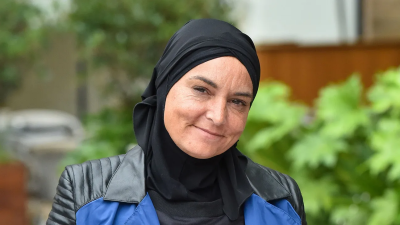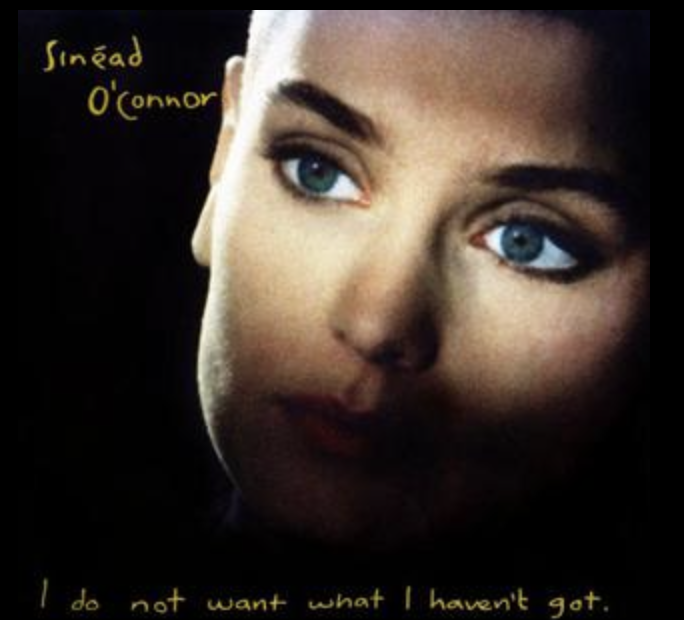
The sudden passing of Sinéad O’Connor, the polarizing Irish songstress who rose to global prominence in the late 1980s, is bound to reignite strong feelings which she coaxed from her audiences both through her haunting vocals and provocative performances. Not just a performer, she was also a firebrand of an activist: a champion for the inequities she saw in the Catholic church and in the conflict that ravaged her native Ireland. You would be hard pressed to find another life that was a better reflection of her tumultuous Celtic homeland.
Along with her siblings, she was an early casualty of divorce. Bouncing between parents after the divorce, she eventually gained stability, living full-time with her mother. However, this perceived stability produced horrific consequences as she and her siblings became victims of abuse at the hand of her mother. In her memoirs, Rememberings, O'Connor recounted her mother crashing purposefully into an oncoming car with her in the passenger seat to carry out a threat against her runaway brother Joe. Her mother frequently beat and verbally abused the children: stripping them, pouring food on them and pummeling them. O’Connor would often take the blame for her younger brother so that he would be spared their mother’s wrath. Sinéad’s older sister Éimear would reciprocate for her.
O’Connor’s mother was also a kleptomaniac, stealing from the collection plate at church, from charity collection bins in town, and even from local open houses, up for sale. Sinéad soon mimicked this behavior. According to O’Connor in her memoirs, she “went to what is politely called a ‘rehabilitation center for girls with behavioral problems’.” She remained a devout Catholic throughout her ordeals, taking refuge in her faith. Her future mantra would be to honor the contract she made with the Holy Spirit, not with record companies.
Becoming tired and bored with the various centers, clinics, and schools in which she was boarded, she left these institutions when she turned sixteen and focused on channeling her creativity into song writing and music. She never lost sight of her individuality nor her commitment to her core beliefs. Busking on the streets of Dublin, she started to catch the eyes of local music producers and began to build her repertoire as a singer. She staunchly adhered to her commitment to guide her career on her own terms. She balked at all attempts by record company management to model herself into what they believed a typical pop star should look like. To her management’s chagrin, she shaved her head, giving her the lockless façade that all have come to recognize.
Her first album, The Lion and the Cobra, launched her well beyond fringe recognition, charting at number 36 on Billboard’s Top 200. She was nominated for a Grammy in the Best Rock Vocal Performance, Female, category. Her success continued on her sophomore offering, I Do Not Want What I Haven't Got, a number one album which yielded O’Connor’s highest charting single, “Nothing Compares 2 U”, written by Prince. Despite these hits and her rise to global stardom, she remained true to her convictions of not selling out to any corporate predeterminations of who she should be or how she should look.

Nominated for three Grammy awards for “Nothing Compares 2 U”, she boycotted the Grammy awards and her only Grammy win. She could not fathom attending the ceremony which celebrated those who achieved material success and failed to use the platform to tell the truth about injustices like censorship, segregation, and child abuse. Because she did not want to fall into that stereotypical pop-star mold, she took her third album, Am I Not Your Girl?, deliberately away from the pop genre and into jazz covers. She writes in her memoirs that composer Tim Rice told her that her recording of “Don’t Cry for Me Argentina” was the best version of the song he had heard.
Seemingly in control of her life and her image, the public had little knowledge of the hurt and pain she endured in her past, and how that molded her into a staunch activist, railing against her Catholic Church in its cover-up of the sexual abuse of children. On October 3, 1992, she brought this cause to international attention when she ripped a photo of Pope John Paul II after a live Saturday Night Live performance of Bob Marley’s “War”. Nine years later, John Paul II would acknowledge the abuse. As a result of this pre-meditated act, she received such a harsh backlash from not only the general population but also from fellow celebrities. The following week on SNL, host Joe Pesci said, "I would have gave [sic] her such a smack", a horrific statement for an abuse victim to have to hear. It has been posited by many that this incident caused her career never to regain the height of her previous popularity.
She remained true to her values and was willing to accept the fallout since it was all for a cause that was so personal to her and her siblings’ upbringing. She states in her memoirs to have lost much of her memory from the years 1992 – 2015 as a result of the backlash. During a visit on Oprah Winfrey’s show, she admitted to attempting suicide in 1999. She also suffered from severe mental health issues following a hysterectomy performed in 2015 in Ireland. The hospital refused to administer hormone replacement therapy which resulted in a “total breakdown” as related in Rememberings. The final tragedy that left her bereft was the suicide of her 17-year-old son Shane in 2022. She voluntarily checked in to a hospital one week later, after contemplating ending her own life.
She lived a life of contradictions: staunchly Catholic from birth yet finding peace as a Muslim in her later years. Fiercely Irish, she yearned for a unified Ireland, free from the armed conflict that ravaged her homeland. A musical star at an early age, she shunned the recording industry and its excesses.
She always remained proud of her music. Her ten studio albums ranged from original compositions to traditional Irish tunes. From reggae to folk to religious over-toned compositions. From the edgy “Mandinka” to the tranquil lullaby, “My Darling Child”. She wrote that, on stage, she could be herself, but off stage, not so much. She finished this thought by writing she never made sense to anyone, including herself, when not singing.
Sinéad O’Connor was a uniquely blended human, shaped by music, family and, sadly, child abuse. She rose to become a global symbol and fierce voice for those who are marginalized and oppressed. The sudden loss of this voice is tragic. There was no better champion than this complex daughter of Erin.
This post mentions suicide. Suicide is complicated and tragic, but it is often preventable. Knowing the warning signs for suicide and how to get help can help save lives. Learn about behaviors that may be a sign that someone is thinking about suicide. For more information, visit https://go.usa.gov/xVCyZ #shareNIMH